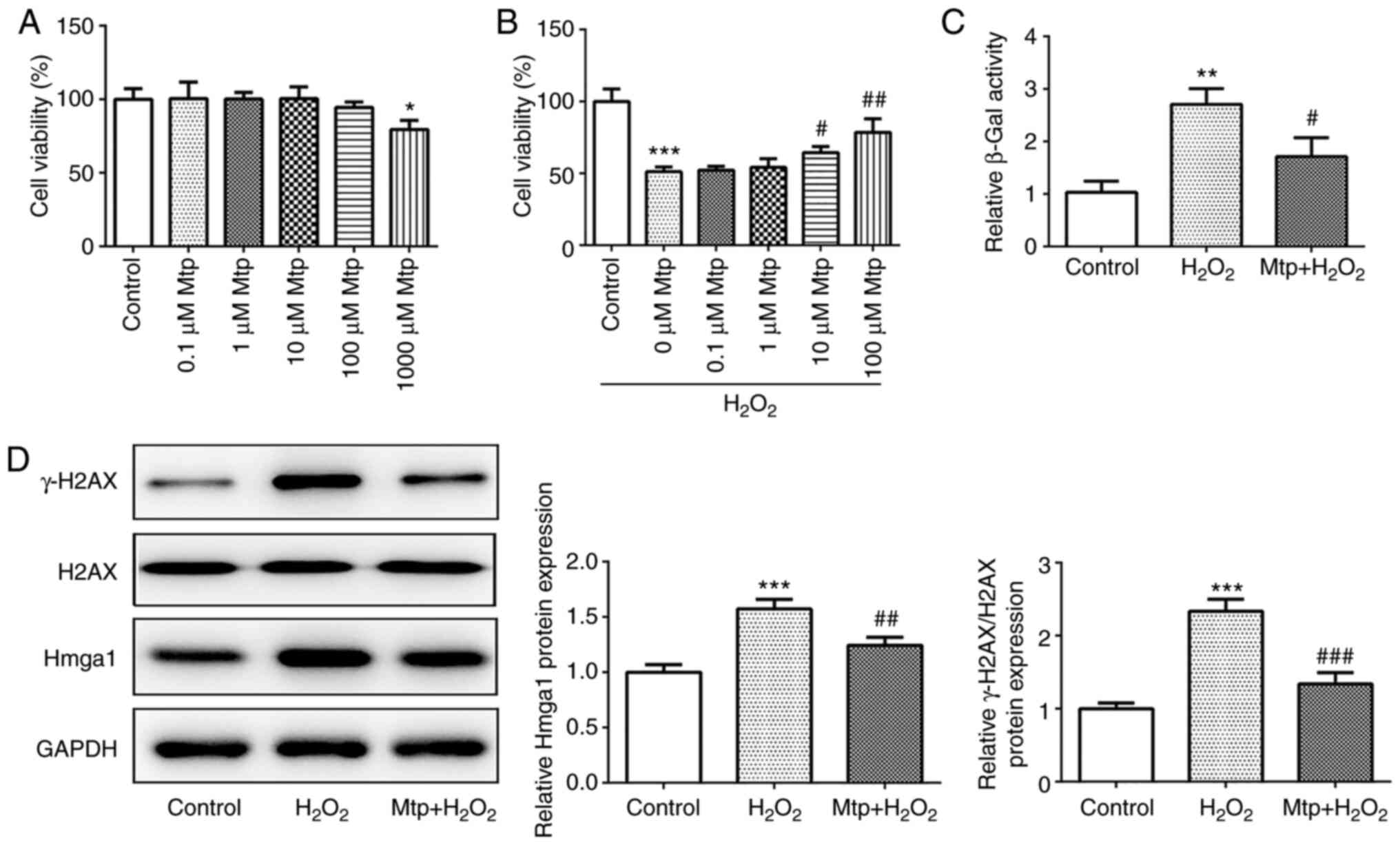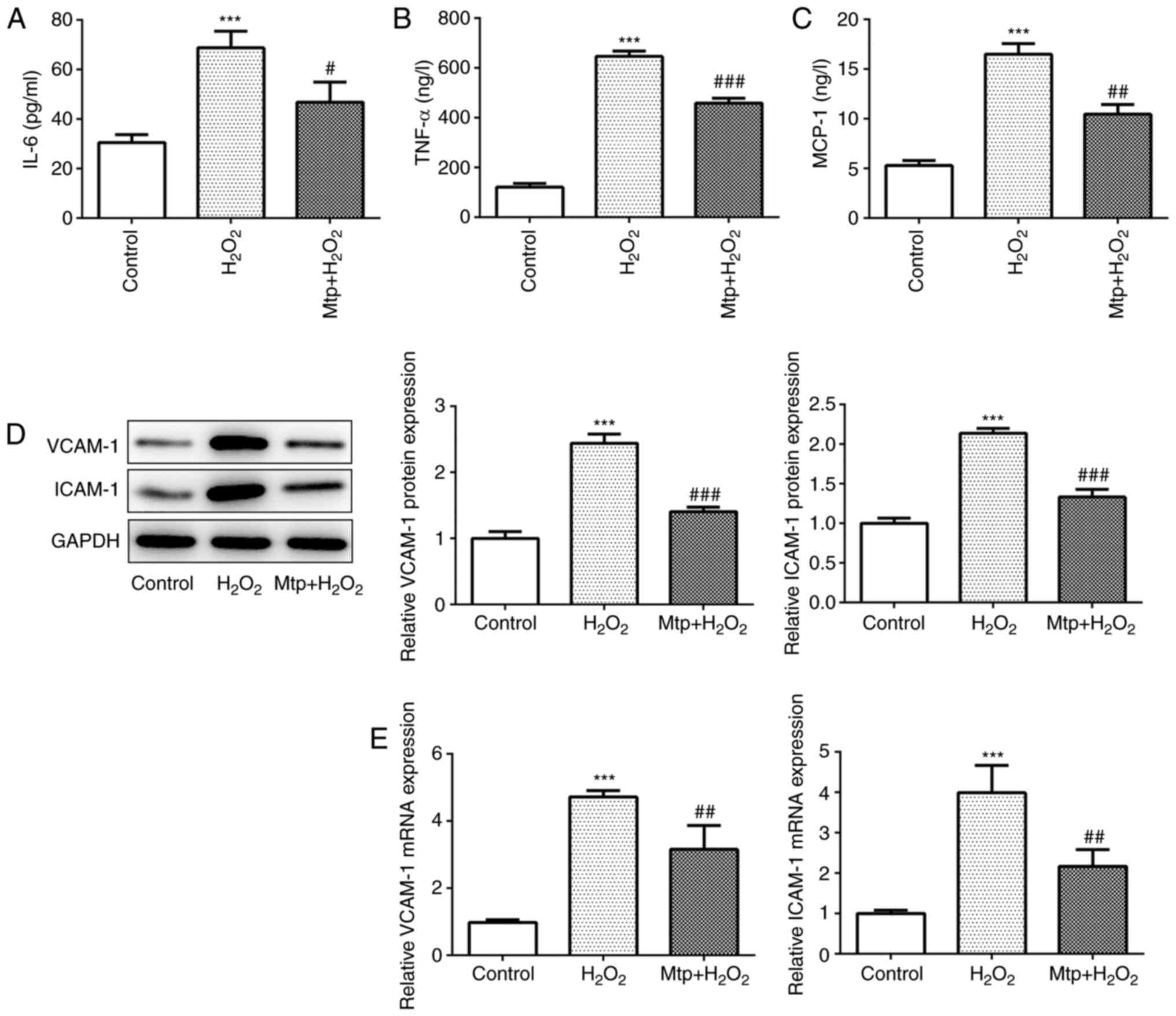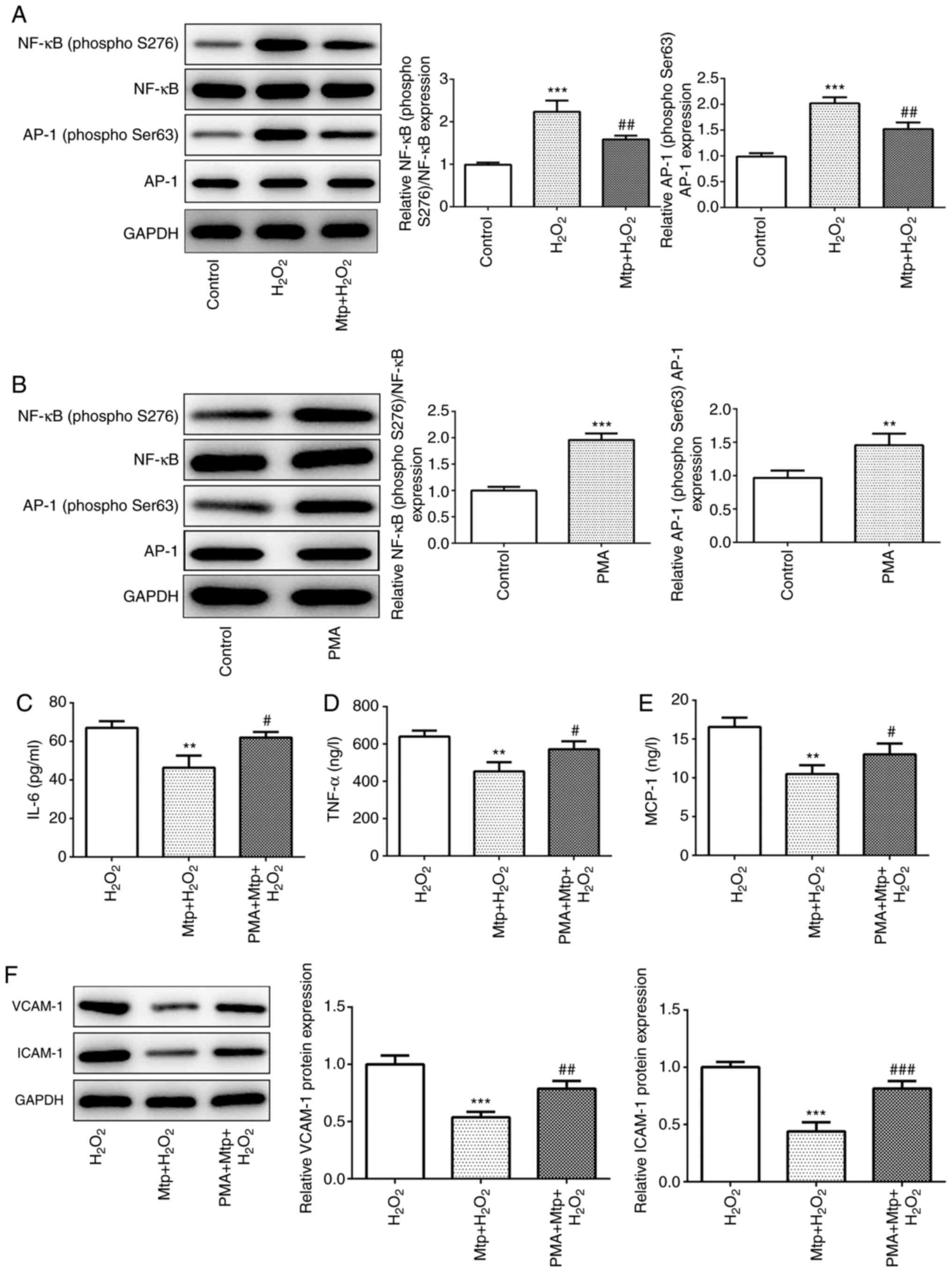|
1
|
Xue B, Head J and McMunn A: The
associations between retirement and cardiovascular disease risk
factors in China: A 20-year prospective study. Am J Epidemiol.
185:688–696. 2017. View Article : Google Scholar : PubMed/NCBI
|
|
2
|
Finegold JA, Asaria P and Francis DP:
Mortality from ischaemic heart disease by country, region, and age:
Statistics from world health organisation and United Nations. Int J
Cardiol. 168:934–945. 2013. View Article : Google Scholar : PubMed/NCBI
|
|
3
|
Paneni F, Diaz Cañestro C, Libby P,
Luscher TF and Camici GG: The aging cardiovascular system:
Understanding it at the cellular and clinical levels. J Am Coll
Cardiol. 69:1952–1967. 2017. View Article : Google Scholar : PubMed/NCBI
|
|
4
|
Montezano AC, Neves KB, Lopes RA and Rios
F: Isolation and culture of endothelial cells from large vessels.
Methods Mol Biol. 1527:345–348. 2017. View Article : Google Scholar : PubMed/NCBI
|
|
5
|
Pierce GL, Lesniewski LA, Lawson BR, Beske
SD and Seals DR: Nuclear factor-(kappa)B activation contributes to
vascular endothelial dysfunction via oxidative stress in
overweight/obese middle-aged and older humans. Circulation.
119:1284–1292. 2009. View Article : Google Scholar : PubMed/NCBI
|
|
6
|
Serino A and Salazar G: Protective role of
polyphenols against vascular inflammation, aging and cardiovascular
disease. Nutrients. 11:532018. View Article : Google Scholar
|
|
7
|
Salazar G, Huang J, Feresin RG, Zhao Y and
Griendling KK: Zinc regulates Nox1 expression through a NF-κB and
mitochondrial ROS dependent mechanism to induce senescence of
vascular smooth muscle cells. Free Radic Biol Med. 108:225–235.
2017. View Article : Google Scholar : PubMed/NCBI
|
|
8
|
Qian Y, Zhang J, Zhou X, Yi R, Mu J, Long
X, Pan Y, Zhao X and Liu W: Lactobacillus plantarum CQPC11
isolated from sichuan pickled cabbages antagonizes
d-galactose-induced oxidation and aging in mice. Molecules.
23:30262018. View Article : Google Scholar
|
|
9
|
Steven S, Frenis K, Oelze M, Kalinovic S,
Kuntic M, Bayo Jimenez MT, Vujacic-Mirski K, Helmstädter J,
Kröller-Schön S, Münzel T and Daiber A: Vascular inflammation and
oxidative stress: Major triggers for cardiovascular disease. Oxid
Med Cell Longev. 2019:70921512019. View Article : Google Scholar : PubMed/NCBI
|
|
10
|
Zhang Z, Zhang Q, Yang H, Liu W, Zhang N,
Qin L and Xin H: Monotropein isolated from the roots of Morinda
officinalis increases osteoblastic bone formation and prevents
bone loss in ovariectomized mice. Fitoterapia. 110:166–172. 2016.
View Article : Google Scholar : PubMed/NCBI
|
|
11
|
Shi Y, Liu XY, Jiang YP, Zhang JB, Zhang
QY, Wang NN and Xin HL: Monotropein attenuates oxidative stress via
Akt/mTOR-mediated autophagy in osteoblast cells. Biomed
Pharmacother. 121:1095662020. View Article : Google Scholar : PubMed/NCBI
|
|
12
|
Wang C, Mao C, Lou Y, Xu J, Wang Q, Zhang
Z, Tang Q, Zhang X, Xu H and Feng Y: Monotropein promotes
angiogenesis and inhibits oxidative stress-induced autophagy in
endothelial progenitor cells to accelerate wound healing. J Cell
Mol Med. 22:1583–1600. 2018. View Article : Google Scholar : PubMed/NCBI
|
|
13
|
Shen X, Luo L, Yang M, Lin Y, Li J and
Yang L: Exendin4 inhibits lipotoxicity-induced oxidative stress in
betacells by inhibiting the activation of TLR4/NF κB signaling
pathway. Int J Mol Med. 45:1237–1249. 2020.PubMed/NCBI
|
|
14
|
Wang F, Zhou H, Deng L, Wang L, Chen J and
Zhou X: Serine deficiency exacerbates inflammation and oxidative
stress via microbiota-gut-brain axis in D-galactose-induced aging
mice. Mediators Inflamm. 2020:58214282020. View Article : Google Scholar : PubMed/NCBI
|
|
15
|
He YQ, Yang H, Shen Y, Zhang JH, Zhang ZG,
Liu LL, Song HT, Lin B, Hsu HY, Qin LP, et al: Monotropein
attenuates ovariectomy and LPS-induced bone loss in mice and
decreases inflammatory impairment on osteoblast through blocking
activation of NF-κB pathway. Chem Biol Interact. 291:128–136. 2018.
View Article : Google Scholar : PubMed/NCBI
|
|
16
|
Huo J, Xu Z, Hosoe K, Kubo H, Miyahara H,
Dai J, Mori M, Sawashita J and Higuchi K: Coenzyme Q10 prevents
senescence and dysfunction caused by oxidative stress in vascular
endothelial cells. Oxid Med Cell Longev. 2018:31817592018.
View Article : Google Scholar : PubMed/NCBI
|
|
17
|
Salman I, Jung L, Adeeb S, Eun-Mi A, You L
and Young L: Decursinol angelate inhibits LPS-induced macrophage
polarization through modulation of the NFκB and MAPK signaling
pathways. Molecules. 23:18802018. View Article : Google Scholar
|
|
18
|
Livak KJ and Schmittgen TD: Analysis of
relative gene expression data using real-time quantitative PCR and
the 2(-Delta Delta C(T)) Method. Methods. 25:402–408. 2001.
View Article : Google Scholar : PubMed/NCBI
|
|
19
|
Tong LT, Ju Z, Liu L, Wang L, Zhou X, Xiao
T and Zhou S: Rice-derived peptide AAGALPS inhibits TNF-α-induced
inflammation and oxidative stress in vascular endothelial cells.
Food Sci Nutr. 8:659–667. 2020. View Article : Google Scholar : PubMed/NCBI
|
|
20
|
Lin CC, Pan CS, Wang CY, Liu SW, Hsiao LD
and Yang CM: Tumor necrosis factor-alpha induces VCAM-1-mediated
inflammation via c-Src-dependent transactivation of EGF receptors
in human cardiac fibroblasts. J Biomed Sci. 22:532015. View Article : Google Scholar : PubMed/NCBI
|
|
21
|
Zhu FB, Wang JY, Zhang YL, Hu YG, Yue ZS,
Zeng LR, Zheng WJ, Hou Q, Yan SG and Quan RF: Mechanisms underlying
the antiapoptotic and anti-inflammatory effects of monotropein in
hydrogen peroxide-treated osteoblasts. Mol Med Rep. 14:5377–5384.
2016. View Article : Google Scholar : PubMed/NCBI
|
|
22
|
Jung YY, Shanmugam MK, Chinnathambi A,
Alharbi SA, Shair OHM, Um JY, Sethi G and Ahn KS: Fangchinoline, a
bisbenzylisoquinoline alkaloid can modulate cytokine-impelled
apoptosis via the dual regulation of NF-κB and AP-1 pathways.
Molecules. 24:31272019. View Article : Google Scholar
|
|
23
|
Lee JH, Kim C, Lee SG, Yang WM, Um JY,
Sethi G and Ahn KS: Ophiopogonin D modulates multiple oncogenic
signaling pathways, leading to suppression of proliferation and
chemosensitization of human lung cancer cells. Phytomedicine.
40:165–175. 2018. View Article : Google Scholar : PubMed/NCBI
|
|
24
|
Wang F, Wu L, Li L and Chen S: Monotropein
exerts protective effects against IL-1β-induced apoptosis and
catabolic responses on osteoarthritis chondrocytes. Int
Immunopharmacol. 23:575–580. 2014. View Article : Google Scholar : PubMed/NCBI
|
|
25
|
Karna KK, Choi BR, You JH, Shin YS, Cui
WS, Lee SW, Kim JH, Kim CY, Kim HK and Park JK: The ameliorative
effect of monotropein, astragalin, and spiraeoside on oxidative
stress, endoplasmic reticulum stress, and mitochondrial signaling
pathway in varicocelized rats. BMC Complement Altern Med.
19:3332019. View Article : Google Scholar : PubMed/NCBI
|
|
26
|
Donato AJ, Morgan RG, Walker AE and
Lesniewski LA: Cellular and molecular biology of aging endothelial
cells. J Mol Cell Cardiol. 89:122–135. 2015. View Article : Google Scholar : PubMed/NCBI
|
|
27
|
Shin JS, Yun KJ, Chung KS, Seo KH, Park
HJ, Cho YW, Baek NI, Jang D and Lee KT: Monotropein isolated from
the roots of Morinda officinalis ameliorates proinflammatory
mediators in RAW 264.7 macrophages and dextran sulfate sodium
(DSS)-induced colitis via NF-κB inactivation. Food Chem Toxicol.
53:263–271. 2013. View Article : Google Scholar : PubMed/NCBI
|
|
28
|
Han Y, Li X, Zhang X, Gao Y, Qi R, Cai R
and Qi Y: Isodeoxyelephantopin, a sesquiterpene lactone from
Elephantopus scaber Linn., inhibits pro-inflammatory mediators'
production through both NF-κB and AP-1 pathways in LPS-activated
macrophages. Int Immunopharmacol. 84:1065282020. View Article : Google Scholar : PubMed/NCBI
|
|
29
|
Zhang T, Chen T, Chen P, Zhang B, Hong J
and Chen L: MPTP-induced dopamine depletion in basolateral amygdala
via decrease of D2R activation suppresses GABAA
receptors expression and LTD induction leading to anxiety-like
behaviors. Front Mol Neurosci. 10:2472017. View Article : Google Scholar : PubMed/NCBI
|
|
30
|
Alvarez SE, Milstien S and Spiegel S:
Autocrine and paracrine roles of sphingosine-1-phosphate. Trends
Endocrinol Metab. 18:300–307. 2007. View Article : Google Scholar : PubMed/NCBI
|
|
31
|
Gay NJ and Gangloff M: Structure and
function of toll receptors and their ligands. Annu Rev Biochem.
76:141–165. 2007. View Article : Google Scholar : PubMed/NCBI
|
|
32
|
Sperlich J, Kerr R and Teusch N: The
marine natural product pseudopterosin blocks cytokine release of
triple-negative breast cancer and monocytic leukemia cells by
inhibiting NF-κB signaling. Mar Drugs. 15:2622017. View Article : Google Scholar
|



















